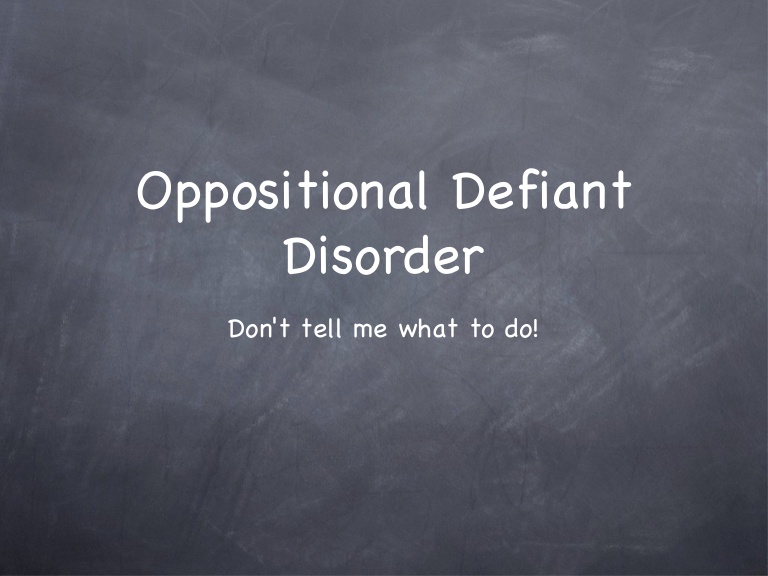Many parents have been shocked at least once by a formerly cooperative teen resisting the house rules, talking back, or otherwise acting defiantly, but this type of behavior may just be part of normal growing up. More is required for a diagnosis of Oppositional Defiant Disorder.
Why Oppositional Defiant Disorder Is Difficult to Understand
There are two main guides to health issues and disorders that are used to guide the diagnosis of Oppositional Defiant Disorder (ODD). Whereas in many cases, these two resources present a similar view of disorders, in the case of Oppositional Defiant Disorder, the categorization is at odds, and this, in addition to a complicated definition, makes it difficult to understand what Oppositional Defiant Disorder is.
The DSM-IV-TR View of Oppositional Defiant Disorder
The Diagnostic and Statistics Manual of Mental Disorders, 4th Edition, Text Revision (DSM-IV-TR) includes Oppositional Defiant Disorder as a subcategory of Attention-deficit and disruptive behavior disorders, along with Attention-Deficit Hyperactivity Disorder, Conduct Disorder, and Disruptive Behavior Disorder NOS (Not Otherwise Specified).
Diagnosing ODD using the DSM-IV-TR criteria, which can only be done by mental health professionals who are qualified to do so,is only after determination that the criteria for Conduct Disorder are not met and, if the person is 18 or older, that criteria for Antisocial Personality Disorder are not met.
In that case, the individual must demonstrate a pattern of behavior that has lasted at least 6 months and shown at least four of the following signs or symptoms:
• frequently losing temper
• frequently argues with adults
• frequently defying or refusing to cooperate with the requests or rules of adults
• frequently annoying others on purpose
• frequently scapegoating others for his or her own mistakes or misbehavior
• frequently showing a high degree of sensitivity and touchiness with others
• frequently acting angry and resentful
• frequently acting spiteful or vindictive.
In addition, the behavior disturbance must:
• be more frequently that is normal for other individuals of similar age and development;
• cause “clinically significant impairment” in at least one area of life, whether academic, social, or occupational;
• not occur solely as the result of a psychotic disorder or mood disorder.
According to the Surgeon General’s website, Oppositional Defiant Disorder is sometimes considered a “precursor of conduct disorder.”
ICD-10 View of Oppositional Defiant Disorder
The International Statistical Classification of Diseases and Related Health Problems, 10th Revision (ICD-10) takes a different approach to Oppositional Defiant Disorder than the DSM-IV-TR. It includes it under the category “Behavioral and emotional disorders with onset usually occurring in childhood and adolescence” within the subcategory “Conduct disorders.” The other members of the category are:
• Conduct disorder confined to the family context
• Unsocialized conduct disorder
• Socialized conduct disorder
• Other conduct disorders
• Conduct disorder unspecified.
As you can see, it is the only member of the category that does not have conduct disorder in its name. The subcategory “Conduct disorders” is separate from the following category, called “Mixed disorders of conduct and emotions,” which addresses the limitation in the DSM-IV-TR diagnostic criteria that rules out behavior that is only present in connection with a mood disorder or psychotic disorder.
The ICD-10 diagnosis, which specifically says that it usually occurs in “younger children,” begins with a child meeting the criteria for Conducts disorders generally. This requires that the pattern of behavior–whether dissocial, aggressive, or defiant—be both repetitive and persistent, as well as well outside age-appropriate expectations, and last six months or longer. If the behavior can be explained by a different psychiatric diagnosis, that explanation should be preferred.
Given that those criteria are met, one goes on to the specific Oppositional Defiant Disorder criteria, which limits the characterization of the behaviors to acts that are “defiant, disobedient, disruptive,” but not delinquent, extremely aggressive, or extremely dissocial, nor merely extremely mischievous or naughty.
The Upshot of Differing Understandings
A research study published in 2005 found that some children who were diagnosed with Oppositional Defiant Disorder using the criteria of ICD-10 as described above received no DSM-IV diagnosis, and this is a problem. The study suggested ways of addressing the situation.
If this comparison does nothing else, it will hopefully equip parents whose child is being considered for an ODD diagnosis, has been ruled out from having such a diagnosis, or has already received such a diagnosis to be able to discuss the criteria whereby the child’s behavior was analyzed and ask knowledgeable questions.
Sources
http://www.surgeongeneral.gov/library/mentalhealth/
chapter3/sec6.html#disruptive
http://apps.who.int/classifications/apps/icd/icd10online/?gf90.htm+f913
http://www.ncbi.nlm.nih.gov/pubmed/16313431
